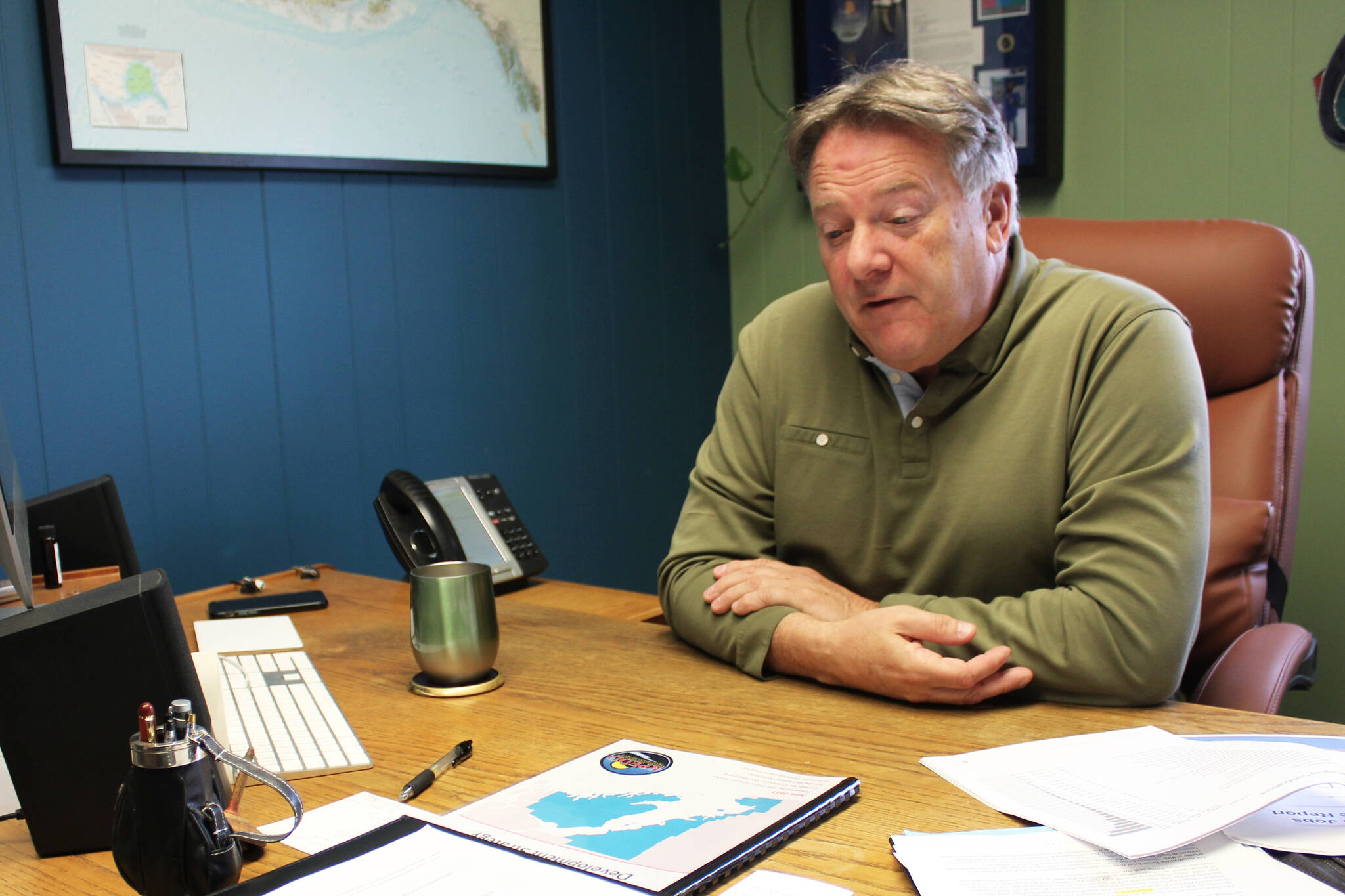A primary hub for economic development on the Kenai Peninsula is on the ground level of a shared building in north Kenai. Those are the headquarters of KPEDD, or the Kenai Peninsula Economic Development District, a far-reaching economic resource for local business operations. It’s run by four people with support from the Kenai Peninsula Borough and acts as a sort of liaison between entities on the peninsula and funding opportunities.
Tim Dillon, who has been the executive director of KPEDD for six years, spoke with the Clarion on Thursday about the group’s recent work. KPEDD most recently finalized a comprehensive economic development strategy for the borough, which Dillon said makes a big difference in securing funding for borough projects. The document — almost 100 pages long — was built following conversations between KPEDD and people across the peninsula over the past year. It is reviewed every five years and outlines the borough’s long-term economic priorities.
It also acts as a starting point for Dillon when someone calls KPEDD for help finding a way to fund a project. Once Dillon places the project under the umbrella of one of the peninsula’s goals, he is better positioned to begin researching funding opportunities. That research may include digging up grant programs sent directly to KPEDD’s email inbox or working his statewide network of connections. From there, KPEDD begins a collaborative process with the organization requesting funds to prepare a packet of application materials that can be submitted in support of their request.
“By having that kind of a document, it helps you to be able to not only look at funding, but also help give us some guidelines of where people want to see us go,” Dillon said.
Those goals — which have an overarching theme of improving the quality of life for peninsula residents — include technology and communications, workforce and human capital, infrastructure and land use, business climate and entrepreneurship and regional partnerships.
Dillon said he has already received inquiries from people interested in applying for funding made available through the American Rescue Plan Act, which President Joe Biden signed into law earlier this year. Sometimes, Dillon said, people seeking funding through the bill do not realize that a large portion of those funds have already been appropriated.
“I’m concerned, too, that our great great-grandkids are going to be paying for this for a long, long time,” Dillon said. “But if the money’s there, and they’re going to give it away to somebody, well, I want as much down here on the peninsula as we can get and that’s why we’re doing things this way.”
Dillon said KPEDD is juggling around 30 projects at any given time that range in price, geography and scope.
For example, Dillon said the Kenai Watershed Forum recently reached out to him about getting funding for an infrastructure project at the mouth of the Kenai River. The first thing he did was consult the list of goals outlined in development strategy to see where the project might fit. He connected it to workforce and human capital because it could impact the commercial fishing industry, infrastructure and land use and regional partnerships, among other things.
While Dillon said he can’t ultimately ensure such projects are funded, the process of consolidating paperwork and putting together a package of information can make it easier to pivot to a different funding option if one falls through.
KPEDD is not just a liaison between local organizations and funding opportunities, however.
Dillon said he thinks KPEDD has shifted its focus over the last six years, from being narrowly tailored to specific industries to embracing the peninsula’s diverse economy. More recently, KPEDD has expanded its online presence through the creation of a new website, the launch of a workforce development site and the creation of videos marketing the Kenai Peninsula to air on the Alaska Channel.
KPEDD is currently working with peninsula businesses to reevaluate their business model and employee recruitment process to adapt to a post-COVID world. Dillon said that includes everything from changing how many days a week a business is open, to being more flexible with eligibility requirements for new hires, to exploring ways the business can be competitive in terms of what it has to offer employees. Employees, he said, may have different priorities than when the pandemic began.
“I just think that people are taking a hard look and seeing what makes sense,” Dillon said. “They’ve also looked inside themselves and said, ‘OK, how much money do I really need? How many hours do I really want to work? You know, life is short. I didn’t see my mom for X number of months because of COVID and my work schedule, what can I do differently?’”
Some of the existential questions workers are asking themselves, Dillon said, are in addition to a reshaping of how people think about employment. A job at McDonald’s, he said, is no longer just a stepping stone to a better job. The company, he said, offers signing bonuses and financial aid for college. Similarly, Safeway offers $20 an hour for cashiers.
“Workforce is going to be interesting for people to kind of grapple with,” Dillon said. “I think the basic minimum wage job as we knew it, or as society knew it, is going to be going away.”
More information about KPEDD can be found at kpedd.org.
Reach reporter Ashlyn O’Hara at ashlyn.ohara@peninsulaclarion.com.

